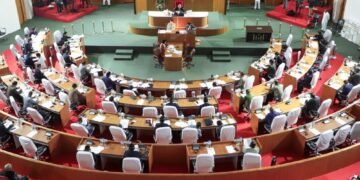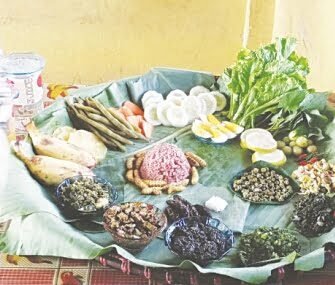The North East Slow Food and Agrobiodiversity Society (NESFAS) along with its partner organisations — Society for Urban and Rural Empowerment (SURE) and North East Network (NEN), Nagaland — hosted several programmes across 27 communities in Meghalaya and Nagaland to commemorate World Food Day today.
As part of the celebration, a food group treasure hunt for children at Pyngkya village in East Khasi Hills was held wherein the participants were divided into three groups. The children were then sent to the nearby forest and cultivation fields, along with adults, to forage the 10 food groups under one hour.
In Khweng and Madanrtiang under Ri-Bhoi district, Participatory Guarantee System (PGS) and Agroecology Learning Circle (ALC) members organised a drawing competition for children at their respective communities.
An Agrobiodiversity (ABD) competition was also held where community members were asked to identify the different food plants at their communities. In the evening, a few Anganwadi workers along with some of the ALC members held an awareness programme and spoke about the importance to conserve agrobiodiversity and local foods.
To instill the importance of local foods in children, community members of Laitthemlangsah, Nongwah, Dewlieh, (all under East Khasi Hills), UmwangNongbah, Khliehumstem (Ri-Bhoi) and MawlumMawjahksew (West Khasi Hills), held drawing competitions under various food-related themes. However, Mawhiang, Lad Mawphlang, Laitsohpliah and Laitumiong community members hosted indigenous cooking competitions throughout the day.
The NESFAS team in Garo Hills, marked the occasion in Samingre, West Garo Hills along with other partner communities — Darichikgre, Daribokgre and Durakantragre — where in the community facilitators took part in a seed-exchange programme. The programme also included sharing of knowledge on the importance of the Indigenous Food Systems by the CFs from Darichikgre, Daribokgre and Durakantragre. Chenxiang R Marak, Associate of NESFAS (Garo Hills) said, “The CFs also spoke about the importance of seeds and right after that, there was an exchange of seeds between these four communities. These are all traditional and local seeds that were exchanged to ensure seed sovereignty.” The Samingre Self Help Groups also sold fresh local vegetables and value added products at the venue.
NEN, on the other hand, organised a cooking competition for rural youth at the NEN Resource Centre at Chizami, Phek District, Nagaland under this year’s theme. The event brought together 65 participants, mostly youth members from Chizami and neighbouring villages. The focus of the programme was to bridge the growing gap between young people and local food systems. It is an attempt to help the youth understand the significance of local food, rediscover and appreciate traditional recipes, explore and exchange innovative recipes using local ingredients.
Three partner communities of SURE on the other hand celebrated the day hosting an essay competition and a recitation competition in Cham Cham (Jaiñtia Hills), an ABD walk in Thangbuli and a indigenous food cooking competition in Mukhap. Participants were only allowed to cook indigenous meals using traditional and local ingredients only.
In his message from Rome, NESFAS chairman and coordinator of The Indigenous Partnership, Phrang Roy said that the World Food Day is an opportunity for indigenous peoples, to show and tell national and international leaders that traditional indigenous food systems and biological and cultural diversity are crucial instruments for a more caring and sustainable world.
Baghmara too celebrated World Food Day 2020 and the Food and Agriculture Organisation’s 75th anniversary at the District Agriculture Office Premises on the Theme, ‘Grow, Nourish, Sustain. Together’.
The keynote address was presented by Bidanchi Marak, Assistant Technology Manager, with District Agriculture Officer P Mawa also speaking on the occasion.
The two motivated farmers to grow more nutritious food and increase production and praised them as food heroes who are making sure that food makes its way from farm to fork even amid the disruptions caused by the Covid-19 pandemic.
Among the farmers present, Brejickson A Sangma and Barmita D Sangma also shared their experiences on farming and encouraged other farmers to grow more nutritious food and follow up with innovative techniques. The programme concluded with rabi season seeds distributed to the farmers by the District Agriculture Office.






























